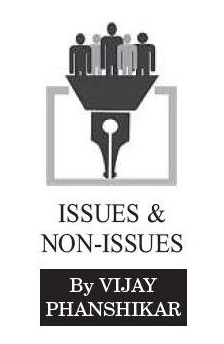Clash Of Definitions
| Date :10-Apr-2021 |

Kolkata (WB), April 7 (Agencies): The Election Commission is said to have sent a notice to West Bengal Chief Minister Mamata Banerjee for trying to fan religious sentiments by asking people of Muslim community not to allow its vote to split during the legislative elections in the State.
Even as the electoral arena was agog with Mamata Banerjee’s speech, Prime Minister Narendra Modi thundered in one of his election rallies that the whole Opposition and some sections of the media would have started shouting against the Bharatiya Janata Party if it ever made an appeal to the Hindu community not to allow its vote to be split. The Prime Minister was referring to double standards that have often dominated the country’s politics.
THIS may be just a small episode in the mega electoral battle now raging in West Bengal or four other States currently. But it represents a phenomenon whose different dimensions are often confusing. We may call this phenomenon as “clash of definitions”, as part of which people try to establish the primacy of the definitions of various ideas and issues that are closer to their hearts.
Some may describe the process as something essential to democracy as a battle-ground of ideas. Some others may offer a different description -- that democracy is not a battle-ground but a melting pot in which various socio-cultural and political inputs are mixed to create a constantly evolving society. Some others may choose to describe democracy as a market-place where criss-cross ideas often struggle to hold the centrestage and occupy popular mind-space. No matter the differing descriptions people may have to offer, it is doubtless true that this clash of definitions is essential and enlightening and also beautiful -- though it may be troublesome to involved parties or persons when it actually takes place, causing a great churning.
The trouble in India, however, is that the debate between ideas often gets cantankerous, often cruel, and often disrespectful of contrarian point of view, guided and goaded by political vested interests that tend to trample classicism into dust and inflict deliberate insults upon others. The contest, unfortunately, is not between right and wrong or between opposite points of view all the time; it is often between elements that want to outsmart the other side in distortion of truth and contortion of purpose. And the reason is simple: political obstinacy, cantankerousness, that defies reason. Such a discourse, unfortunately, has given a bad name to democracy as a system -- at least in India.
This is what has happened in most places when false narratives are slapped on the society and the promoters adopt mule-like attitude and refuse to see sense as regards the subject of debate. In West Bengal, Miss Mamata Banerjee has responded most negatively to the notice by the Election Commission as regards her speech appealing Muslims not to allow their vote to be split. She has insisted that she would continue repeating the appeal -- which in the nutshell talks of asking people to come together on the basis of religion as a electoral and political counter-weight to secular principles that we often talk about.
But then, this has been Miss Banerjee’s method and manner -- of refusing to think and act sensibly only because such a defiance of reason suits her politically and electorally. Unfortunately, Miss Banerjee represents much of the Opposition counter-narrative of senseless rejection of reason.
By no standard can this be called essential and integral to democracy as a melting pot of ideas and ideologies -- that give rise to something scintillating, more stimulating in favour of a stronger sense of togetherness. The debate in India, thus, is only a senseless defiance of reason, a purposeful rejection of the principle of honourable disagreement.
What the Indian democracy is looking for is a clash of definitions -- aimed finally at achieving a common meaning of an idea under conflict. Once that common meaning is arrived at, then the system, the society, the country must accept it as an outcome of a great popular churning that throws away the scum and picks up the cream.
This is not a utopian expectation, however, such a kind of democracy existed in India ages ago when conflicting ideas and ideals were often put to test in public forums, when an existentialist arguer like Charvaka was accepted as a seer of the larger cause of philosophy. The current cantankerousness, unfortunately, is a gift the British gave to the Indian society where being argumentative is treated as a virtue just for the heck of it.
Today’s democracy in India offers a great spectacle of an ongoing clash of definitions -- of secularism, of religion, of nationalism, of patriotism, of State, of the correct economic requirements of the emerging society, of the essentials of an inclusive social architecture ...!
Let us not shy away from accepting the reality that much of this public debate in our country is cantankerous, acrimonious, and even dishonest. But let us not allow ourselves to be afflicted by a sense of despair about the process as a whole. Let us keep our belief in the democratic debate ‘alive and kicking’, as the proverb goes. Let us keep our hope intact that someday, the right narrative will endure everything else and will offer the society a right direction for the onward journey.
Is this too lofty an expectation? Is it a utopia that we must chase?
True, any expectation of this kind is lofty, and even utopian, to say the least. But then, every democracy in a rapidly maturing society has to harbour such an ideal. To some, this may be a terribly abstract expectation. To some others, this may be a terribly misleading day-dream. Yet, let us not shy away from accepting the truth that India needs it.